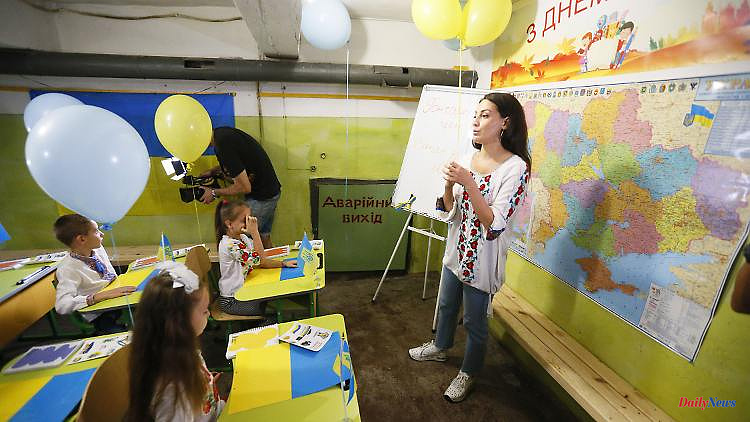School has started again in Ukraine, still mainly online. The Ukrainian German teacher Karina Beigelzimmer talks about worries and fears. Of small moments of happiness and deep emotion.
To be honest, unlike usual, I looked forward to this new school year with very mixed feelings. I think this will be a very, very difficult school year for all of us, teachers, students, parents. The hardest thing ever.
Here in Odessa, 97 percent of parents voted against face-to-face classes. What I can understand is that we keep having air alerts and sometimes impacts. Parents are afraid they will feel safer if their children study from home.
In general, only schools with an air-raid shelter are allowed to hold face-to-face classes. Nationwide, only 40 percent of school buildings have this facility. In my school there is an air-raid shelter in one of the buildings, and that's where the only face-to-face lessons take place: for one of the two 1st primary school classes.
The first day of school showed that we live in a state of emergency. Normally, the Day of Knowledge, as we call it, is a big festival. The students are nicely dressed, colorful balloons are hanging everywhere and there is music. Everything fell out this year.
In return, the 8th graders gave the class teacher and me a nice moment. They invited us to a coffee in the bar opposite the school. Although you could also feel here that everything is different. This cafe is usually full when school starts. There was enough space this time. Still it was nice. The students were happy to meet again and I felt like I could breathe freely again for a while.
Compared to other cities and towns, the schools in Odessa have gotten off lightly so far. I recently read a statistic that said more than 2,000 schools across the country were damaged and over 260 were completely destroyed. And then there are the schools that are located in the occupied territories.
Of course, online classes are still better than no classes at all. After two years of pandemic and more than half a year of war, there is no lack of opportunities and instruments to carry it out properly. Especially in the cities. In rural areas, the fast internet connection is still lagging behind. In any case, there are countless platforms through which to teach, as well as the possibility, for those who cannot pick up the textbooks - they are free with us - to download them. This also enables students who are now abroad to attend classes.
But that doesn't change the fact that the relationship between student and teacher through the computer screen is very different. I would call them artificial. And not only do I feel that, but also the students.
A few days ago one of my students went to our school to get some books from the library. Since she was already there, she took the opportunity to take photos of the corridors and the classes and then put them on our platform. I asked her why she did it. "So that we don't forget what our school looks like." That touched me deeply. You have to imagine that: photographing classes and corridors for your classmates who have fled.
A lot of attention is also paid to safety precautions in case of flight alarms and attacks. Above all, but not only, the students in face-to-face classes are instructed on what to do in such a situation.
That's good and important, of course, but it still makes me sad. It's all so terrible because they are children of war. What is growing up now is a traumatized generation and I don't know how long it will take for those scars to heal. And who knows how long this war will last.
For all students who are now abroad, what they do there will be recognized when they return to Ukraine. There will only be exams in subjects they didn't have, for example in Ukrainian and history. Homeschooling is also planned. Anyone who has chosen this alternative must take an exam twice a year.
And speaking of subjects. As for literature, or rather foreign literature, Russian writers have been removed from the program and replaced by writers from other countries. History lessons are also more focused on the history of Ukraine than before.
Like I said, I think we're going to have the toughest school year we've ever experienced. And I wish all students, parents and teachers the necessary perseverance and that they do not lose courage, because it is very difficult to live without courage.












